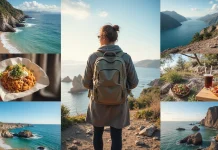Budget Travel Trends for 2025: What to Expect
As the world continues to evolve, so too do the ways in which we explore it on a budget. Travelers today are more resourceful, knowledgeable, and tech-savvy than ever before. This evolution has led to some fascinating trends that are set to shape budget travel by 2025. Whether you’re a backpacker, a couple planning a getaway, or a family looking to save on vacation costs, understanding these trends can help you plan more fulfilling and economically feasible travel experiences. Let’s dive into what you can expect.
Emphasis on Local Experiences
Travelers are increasingly seeking authentic local experiences rather than tourist traps and heavily commercialized attractions. This shift is not just a pursuit of authenticity but also a bid to save money on exorbitant entrance fees and inflated prices at major tourist spots.
Volunteering and Work-Stay Programs
Platforms like Workaway and WWOOF have been facilitating cultural exchanges and volunteer opportunities across countries. By 2025, more travelers will be engaging in volunteer work or opting for work-stay programs. These options provide a more immersive experience at little to no cost beyond travel expenses, fostering a deeper connection with local cultures.
Community-Based Tourism
Community-based tourism allows travelers to contribute directly to local economies by participating in tours and activities operated by members of the community. This type of tourism not only supports sustainable travel practices but also presents more affordable options for budget travelers by eliminating the middleman.
Digital Nomadism Going Mainstream
Remote Work-Friendly Destinations
The COVID-19 pandemic accelerated the popularization of remote work, and this trend is here to stay. Many countries are adapting by offering digital nomad visas, making it simpler for remote workers to temporarily relocate and explore new destinations without disrupting their professional lives. As more people choose this lifestyle, expect increased demand for affordable long-term stays and coworking spaces.
Rural and Lesser-Known Destinations
Digital nomads are exploring locations that are less crowded and more serene, moving beyond urban centers. By opting for rural areas or smaller towns, nomads benefit from a lower cost of living and engage more deeply with local communities. This trend also helps in dispersing tourist traffic, easing the burden on more popular destinations.
Tech-Driven Savings
Our reliance on technology for travel planning and savings is only increasing. From innovative apps to data-driven travel insights, technology is placed front and center in the modern-day travel experience.
AI-Powered Travel Planning
Artificial Intelligence (AI) is rapidly becoming an integral part of travel planning. AI not only helps travelers find the best deals on flights and accommodations but also personalizes recommendations based on preferences. By 2025, expect AI tools to provide even more precise and valuable insights that make budget travel smoother and more accessible.
Blockchain and Cryptocurrency Travel Solutions
Blockchain technology could revolutionize how we book travel services by 2025. The transparency and security it offers mean less money spent on service fees and intermediaries. Additionally, more platforms may start accepting cryptocurrencies as payment, giving travelers greater freedom with their finances and potentially reducing currency conversion costs.
The Rise of Sustainable and Eco-Friendly Travel
As concerns for the environment grow, travelers are becoming more mindful of their ecological footprint. Sustainable travel isn’t just a buzzword anymore—it’s a movement for those who wish to see the world without harming it for future generations.
Eco-Friendly Accommodations
Budget travelers are increasingly opting for accommodations that prioritize sustainability. Properties that incorporate renewable energy, support local communities, and minimize waste are on the rise. Hostels and budget hotels will continue to explore eco-friendly initiatives to attract environmentally conscious guests.
Micro-Transport and Shared Mobility
Electric scooters, bike-sharing systems, and other micro-transport options are becoming more prevalent in cities worldwide. It offers travelers an inexpensive and eco-friendly way to explore their surroundings. Budget travelers appreciate not only the cost savings but also the unique perspectives these modes of transport afford.
Microadventures and Short Getaways
As work becomes more flexible and the need to unplug grows, microadventures—short, local, and intense travel experiences—and short getaways are trending. They allow people to travel without breaking the bank or requiring a lot of time off work.
Weekend and Day Trips
Weekend trips and day trips are gaining in popularity, driven by their accessibility and affordability. Travelers are finding adventure closer to home, cutting down on transportation costs and time. This trend is also fueled by the rise of social media, as quick trips can offer instant content worthy of sharing.
Urban Adventure Activities
Urban adventure activities like city hikes, food tours, or urban kayaking present unique ways to explore cities without the hefty price tag of more traditional tourism activities. These activities allow travelers to experience the thrill of adventure while staying within city limits, making them cost-effective and convenient.
Innovative Accommodation Solutions
As budget travelers become more savvy, they are turning to innovative accommodation options that prioritize value without sacrificing comfort.
Home Exchanges
Home-exchange platforms provide travelers with the chance to swap residences with someone else, enabling them to live like a local with no accommodation costs. By 2025, more families and solo travelers will likely engage in direct or platform-mediated home swaps as a no-cost accommodation strategy.
Couchsurfing Evolution
While Couchsurfing has been a mainstay for budget travelers, newer apps and websites are offering similar services with enhanced features. These platforms cater to those who wish to engage in cultural exchanges, forming deeper connections with hosts rather than merely scoring a free place to stay.
Health and Wellness Travel
There’s an increasing emphasis on health and wellness, and these travel experiences are becoming more budget-friendly and accessible to a broader audience.
Budget-Friendly Retreats
Affordable wellness retreats are allowing more travelers to indulge in health-focused holidays. By offering basic accommodations with a focus on activities such as yoga, meditation, and outdoor activities, these retreats are providing enriching experiences without the high costs associated with traditional wellness tourism.
DIY Spa Experiences
Travelers are becoming adept at crafting their own spa experiences by utilizing local and natural resources wherever they are. Whether it’s a mud bath in a local river or a self-administered massage with essential oils bought at a local market, DIY spa options are popular among those looking to relax without splurging.
Overtourism and Its Repercussions
As the travel industry rebounds from the pandemic, issues of overtourism are likely to persist. However, travelers and destinations alike are becoming more conscious of this problem and are taking steps to mitigate its impact.
Travel Quotas and Off-Peak Incentives
Some destinations are implementing travel quotas to control numbers and maintain the integrity of their natural habitats and cultural sites. Visiting during off-peak times is becoming increasingly popular. Travelers benefit from reduced costs and less crowded sites, while destinations can manage tourist flow more effectively and sustainably.
Awareness and Education
Travelers are now more aware of the impact their journeys can have on the destinations they visit. By investing in education and self-awareness, many are choosing responsible travel options that minimize negative consequences for the destinations and cultures they explore.
Conclusion
The landscape of budget travel in 2025 is set to provide richer, more sustainable experiences for those who wish to wander without financial strain. By being mindful of the trends shaping the future, travelers can optimize their journeys, ensuring they are both economically feasible and culturally enriching. From tech-driven solutions to locally immersive experiences, the world of budget travel is full of opportunities ready to be explored.































